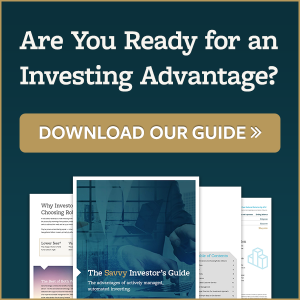Know These 7 Behaviors That Make You a Bad Investor
April 18th, 2019 | Posted in InvestingHuman brains are good at finding patterns and recognizing trends. You’d think that would make us all great investors.
Actually, no.
All brains have biases. For investors, it’s vital to recognize when those biases are leading us down the wrong path. At the Chartered Financial Analyst Institute, the curriculum includes a behavioral finance course that explores why people make the decisions they do. Below are common behaviors they cite that often lead to poor decisions. If you hear your brain say any of these things, take note!
“I’m Smarter Than Those Dummies”
Overconfidence is when you place too much confidence in your ability to predict the outcomes of your investment decisions. Overconfident investors tend to make large bets and are often not sufficiently diversified.
 “That Doesn’t Mean I’m Wrong”
“That Doesn’t Mean I’m Wrong”
Anchoring is a consequence of your brain not accepting new information. For example, you make an investment decision based on a certain set of data. Later, you get new, contradictory data; but rather than conduct a new analysis, you just revise the old one. So you may make investment decisions based on incorrect information.
“Why Should Next Time Be Different?”
Representativeness is when you assume the past automatically predicts the future. For instance, a company has demonstrated a history of earnings growth, so you assume that trend will continue without investigating whether that’s likely. As a result, you may miss important changes in company fundamentals.
“This Stock I Love is Due for a Turnaround”
Loss aversion is what causes a gambler on a losing streak to keep doubling down in hopes of breaking even. If one of your investments is down 20%, there’s likely a good reason. The best decision may be to just book the loss and move on rather than throwing good money after bad.
“Remember That One Time…”
Remembrance is when past unfavorable outcomes affect future behavior. For example, you sold a stock after a 20% gain, only to watch it rise another 20%. Or the time you didn’t sell a stock before it plummeted. Your brain remembers such stinging episodes and tries not to repeat them, so you end up investing too conservatively or not at all.
“I’ll Just Go With the Flow”
Frame dependence means changing your risk tolerance according to changes in the market. For example, you abandon your allocation when market is falling, or lose discipline and invest more speculatively when it’s rising. This often causes investors to buy high and sell low.
“No Way I Could Have Seen That Coming”
Defense mechanisms are excuses we use when strategies fail. Common ones include
- If only. “If only that one thing hadn’t happened, I would’ve been right!”
- Waiting for Godot. You can lose a lot of money waiting for a certain event to take place.
- So what if that one pick went wrong? That doesn’t mean all your similar ones will, right?
Zacks Advantage Takes the Emotion Out of Investing
The analytical, numbers-driven approach to investing used by Zacks Advantage helps eliminate mistakes caused by investor bias. Our investment team employs an array of metrics to vet investments and evaluate the strategies we use to choose them. Here are just a few:
- Proprietary Forecast Model, evaluated on a monthly basis in accordance with our adaptive 10-year model
- Proprietary ETF Ranking System, the foundation of our ETF selection process
- Asset Allocation Process based on mean variance optimization
Read more about these processes, and others we use, here.
Learn more about how Zacks Advantage combines the simplicity and low fees of a robo advisor with performance-focused active management. Download our Overview Guide today!
Sources: CFA Institute and Business Insider
Past performance is no guarantee of future results. Inherent in any investment is the potential for loss
Zacks Advantage is a service offered by Zacks Investment Management, a wholly-owned subsidiary of Zacks Investment Research. Zacks Investment Management is an independent Registered Investment Advisory firm and acts as an investment manager for individuals and institutions. All material in presented on this page is for informational purposes only and no recommendation or advice is being given as to whether any investment or strategy is suitable for a particular investor. Nothing herein constitutes investment, legal, accounting or tax advice. The information contained herein has been obtained from sources believed to be reliable but we do not guarantee accuracy or completeness. Zacks Investment Management, Inc. is not engaged in rendering legal, tax, accounting or other professional services. Publication and distribution of this article is not intended to create, and the information contained herein does not constitute, an attorney- client relationship. Do not act or rely upon the information and advice given in this publication without seeking the services of competent and professional legal, tax, or accounting counsel.

